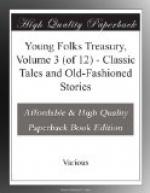The silence was followed by loud cheers. The judges were all agreed that the old blind harper, who had played last, deserved the prize. The simple, sad air, which had moved all who listened, was composed by himself. He was asked to give the words belonging to the music, and at last he modestly said he would repeat them, as he could not see to write. Miss Somers took her pencil, and as the old harper repeated his ballad, she wrote the words. He called it “Susan’s Lamentation for her Lamb.” Miss Somers looked at her brother from time to time, as she wrote, and Sir Arthur, as soon as the old man had finished, took him aside and asked him some questions, which brought to light the whole story of Susan’s lamb and of Attorney Case’s cruelty.
The Attorney himself was present when the harper began to repeat his ballad. His color, as Sir Arthur steadily looked at him, changed from red to white, and from white to red, until at length he suddenly shrunk back through the crowd and left the room. We shall not follow him. We had rather follow our old friend the harper. No sooner had he received the prize of ten guineas, than he went to a small room belonging to the people of the house, asked for pen, ink, and paper, and dictated, in a low voice to his boy, a letter, which he ordered him to put at once into the post-office. The boy ran off with the letter and was but just in time, for the postman’s horn was sounding. The next morning Farmer Price was sitting beside his wife and Susan sorrowing that his week’s leave was nearly at an end, and that they had not enough money to give to the man who was willing to go in his place, when a knock was heard at the door. Then the person who delivered the letters in the village put one into Susan’s hand, saying, “A penny, if you please—here’s a letter for your father.”
“For me!” said Farmer Price; “here’s the penny then; but who can it be from, I wonder? Who can think of writing to me, in this world?” He tore open the letter, but the hard name at the bottom of the page puzzled him—“your obliged friend, Llewellyn.”
“And what’s this?” he said, opening a paper that was enclosed in the letter. “It’s a song, seemingly; it must be somebody that has a mind to make an April fool of me.”
“But it is not April, it is May, father,” said Susan.
“Well, let us read the letter, and we shall come to the truth all in good time.”
Farmer Price then sat down in his own chair, and read as follows:
“My worthy friend—I am sure you will be glad to hear that I have had success this night. I have won the ten-guinea prize, and for that I am much indebted to your sweet daughter Susan; as you will see by a little ballad I enclose for her. Your kindness to me has let me learn something of your family history. You do not, I hope, forget that I was present when you were counting the treasure in Susan’s little purse, and that I heard for what purpose




